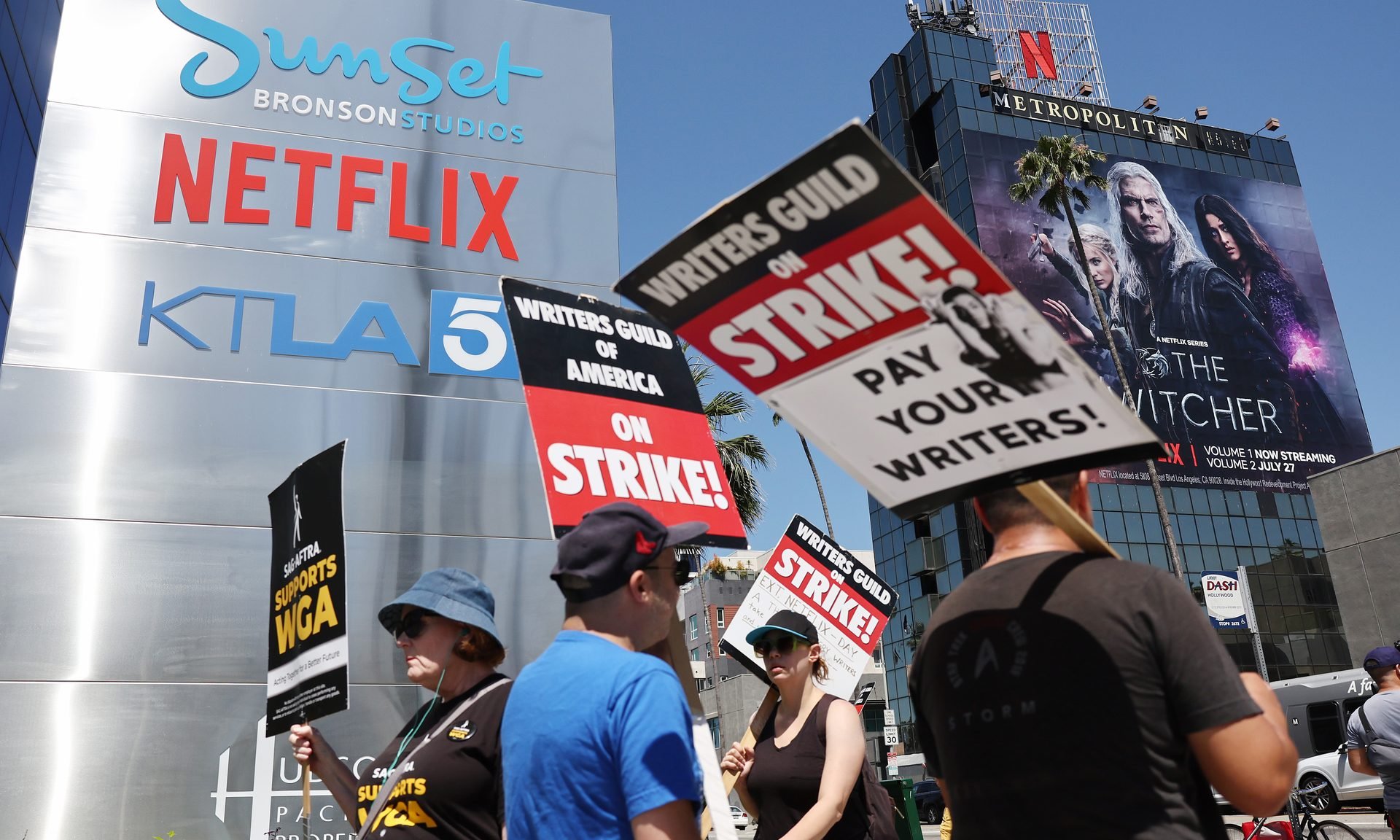Striking Writer: ‘This Fight Is a Fight That Is Deep’
A late night TV writer spells out what’s at stake in the ongoing WGA strike.

Many, or all, of the products featured on this page are from our advertising partners who compensate us when you take certain actions on our website or click to take an action on their website. However, this does not influence our evaluations. Our opinions are our own. Here is a list of our partners and here's how we make money.
Update on Sept. 27: The WGA strike is tentatively set to end after nearly 150 days. On Sept. 24, the Writers Guild of America and the Alliance of Motion Picture and Television Producers reached a tentative agreement. Members still must vote to ratify the new three-year contract. But workers may now return to work. Late night talk shows will likely be the first productions to get back up and running since scripted series and films are still being impacted by the SAG-AFTRA strike. See this story for more details on the WGA deal.
The story below first published on Aug. 31.
Nearly 120 days have passed since the Writers Guild of America (WGA) went on strike.
The union, which represents writers in television and film entertainment, has locked horns with the Alliance of Motion Picture and Television Producers (AMPTP), the bargaining group that represents major Hollywood studios and streamers including Amazon, Apple, Disney, NBCUniversal, Netflix, Paramount, Sony and Warner Bros. Discovery.
The strike began May 2, and the two sides began bargaining on Aug. 11 — but with no progress to report yet.
Meet MoneyNerd, your weekly news decoder
So much news. So little time. NerdWallet's new weekly newsletter makes sense of the headlines that affect your wallet.
As the strike wears on, TV and film consumers might be curious as to why a deal has not yet been struck and what the WGA is waiting for. To learn more, NerdWallet spoke with Sal Gentile, a WGA member and supervising writer and producer of the “A Closer Look” segment on “Late Night with Seth Meyers.” We spoke about how streaming has broken the old compensation model for writers, the threat artificial intelligence poses to the profession, the larger labor movement and morale on the picket lines.
The following interview has been edited and condensed for length and clarity.
NerdWallet: Can you walk me through, at a high, high level, why entertainment writers are striking?
Sal Gentile: There was already a model for how creative people in this industry were compensated, and that model has been broken by streaming.
The old model was collectively bargained over many decades. And those gains involved residual payments, which is essentially a profit-sharing payment for the reuse of your material. If you write an episode of a TV show or a movie, you obviously get paid once for the original creation of that, but your material can be reused many, many times — especially if a show is very successful. The way that our unions have collectively bargained for us to be compensated for the reuse of our material is through residual payments. That is a key element of how actors, writers and many other creative professionals in the entertainment industry were able to put together sustainable, livable careers.
In this industry, it's very rare to have a steady 52-week job throughout the entire year. Usually you're going from project to project. The way to have a livable career in this industry is to patch those projects together with residual payments.
“ We've seen incredible solidarity on picket lines. We’ve picketed with union members from all other kinds of industries — everybody from flight attendants to nurses to health care workers to truckers to Teamsters to unionizing Starbucks workers. ”
Sal Gentile, Writer and producer, “Late Night with Seth Meyers"
We're talking about the bulk of middle-class working actors and writers and other professionals in this industry going from gig to gig. There are thousands of workers like that. It's not just the famous names that you know.
Even the most successful people in the industry — the most famous actors, the most successful showrunners and writers — are on the picket lines in solidarity with everybody else, because they've also been in that position. They know that in order to get where they are now, they first had to be just regular working writers and actors, and they had to cobble together careers just like the rest of us are having to do now. And they did that through residuals. Now streaming has changed all that.
NerdWallet: And how has streaming changed that, exactly?
Sal Gentile: For one, it’s changed TV production schedules. TV production schedules used to be very fairly predictable. You'd have a predictable length of employment and you'd have a predictable minimum guarantee of work and a predictable amount of pay. Now, TV production schedules are scrambled by streaming. You don't have to do things sequentially or concurrently the way that they used to.
In TV, for example, let's say there were 23 episodes of TV in a season a year. You'd have to start writing and then continue working as the show was being produced. Because it's such a long season, you can't write a 23-episode TV show in four weeks. But now studios are asking writers to do all of that work at once because there are shorter seasons.
Normally in the past, if you were a TV writer, you would stay on throughout the production of a TV show because you’d have to constantly be rewriting your material. That still happens on shows now, but because the production schedules are different, streamers often tell writers, "Do your writing in the span of a couple of weeks and then your term of employment ends."
The other thing, of course, is residuals. We used to have very clear viewership data. We used to know how much your material was reused. We don't have any of that transparency. And the rules governing residuals just don't apply to streaming because it’s new. So now, writers’ material can be reused in the same ways on streaming that it would have been on traditional linear television, but you're not getting paid the same. Not even anywhere close.
NerdWallet: What about artificial intelligence? How specifically does it threaten entertainment writers?
Sal Gentile: So first thing I’ll clear up is that writers and creative professionals, in general, are not afraid of AI technology. We just want to be able to use it for our own creative ends — harness it for ourselves rather than have it replace us.
What we're afraid of is that creative professionals have been generating all of this content and AI is being trained on that content. Everything that AI creates is a product, an amalgamation of human creativity. Once it's trained on that, we're afraid it'll be used to replace us. I think the fear is that studios will start using AI to generate ideas or to generate scripts and then have writers come in and revise or edit or punch up those scripts for much less compensation, and for a much shorter duration of employment.
All we're asking for are rules and regulations to be put in place. We don't think AI is going to magically disappear. We just want the ability to ensure that it doesn't use our own creativity and our content to replace us, but that we can use it as a tool to enhance or supplement our creativity.
The first time you ask ChatGPT to do something it’s like watching a magic trick. It definitely is an impressive magic trick. Absolutely. And entertaining, and in this case useful. But it still is fundamentally, at least for now, a magic trick. I tried writing a prompt asking for a monologue in the style of a late night comedy show. And it was like, "Folks, it's getting cold out there, is it not?"
NerdWallet: Brutal.
Sal Gentile: Yeah, but it'll get better. I don't want to be naive about that. I'm sure it will one day be able to spit out something that's a convincing monologue joke. But that will itself just be an amalgamation of monologue jokes that were already written by humans.
NerdWallet: You mentioned how the DGA has been supportive. What support have you seen from other unions?
Sal Gentile: There is, without a doubt, a huge awakening in the labor movement happening over the last couple of months or maybe even the last few years. And it is absolutely happening across a broad array of different sectors and industries.
We've seen incredible solidarity on picket lines. We’ve picketed with union members from all other kinds of industries — everybody from flight attendants to nurses to health care workers to truckers to Teamsters to unionizing Starbucks workers.
I think working-class people across various industries are finally asserting themselves. And I think it's definitely a chain reaction where the more that you see one union asserting itself, the more confident and emboldened you would feel to step forward as well. That's why cross-industry solidarity has been so valuable to me, because it feels like no matter what the differences are in our various jobs, we all fundamentally have the interests of protecting working people in common.
NerdWallet: How has morale been on the picket lines?
Sal Gentile: I’ll speak for myself. I believe, righteously and passionately, in the cause that we are fighting for. But I've also said many times, I love my job and I love writing. And whenever we get a fair deal, I'll be excited to return.
I don't think anybody is happy about not working. But going to the pickets has been such an incredible morale boost, and it's such a salve for anybody who may feel frustrated by the studio's intransigence.
But it's just been an incredible balm for that frustration to go to a picket and feel the solidarity again, not just with writers, but with so many other unions. It's a real community building opportunity as well.
Obviously nobody is producing any content at all for companies, but people can do things for themselves at home. You know, people can work on their own projects that you may not necessarily have had time for. People are writing newsletters and Substacks and articles for news organizations to explain what's going on at the strike.
NerdWallet: What has life been like for you since the strike began?
Sal Gentile: I feel incredibly proud of and inspired by our union and our membership. Our fight is incredibly righteous and just, and I feel very invested in what we're fighting for.
I've said very vocally that I love my job. I can't wait to go back to writing jokes about the news. It's very cathartic to get to do that, especially with so much insane news happening on a daily basis. So I definitely spend a lot of time in my apartment just sort of pacing around, you know, yelling to nobody in particular about things that I would normally be channeling into a comedic breakdown of the news.
But there's just such a community and camaraderie to everybody being in this together. Everybody's going through it. Everybody wants to write. Everybody in this union loves what they do. We really also care about the future of the profession and doing everything possible to protect it for the people who come after us.
NerdWallet: The average consumer may not think that they have any skin in this game. What would you say to them?
Sal Gentile: I would say that I think this fight is a fight that is deep. I think the fundamental principles in our fight apply to virtually every other worker across every other industry. It's writers now, but it's happened to other industries before us and will to other jobs after us. The elite class of capitalists at the top have the resources to fundamentally disrupt all of these industries. They're going to keep trying to hollow out the working and middle classes in this country and specifically to undermine our collective power.
I think our fight is very similar to the fight of flight attendants, to the fight of teachers and health care workers and truckers. I would say to the average consumer, if you see the importance of this fight, you see that it could potentially apply to you as well, to your job and your industry.
If you're purely coming from the perspective of somebody who's concerned about content that the industry puts out, the industry is going to make better content if we can have writers and actors and other creative professionals who all have livable, sustainable careers in this industry.
Everybody's going to make better stuff that way.
(Photo by Mario Tama/Getty Images News via Getty Images.)
Article sources
NerdWallet writers are subject matter authorities who use primary,
trustworthy sources to inform their work, including peer-reviewed
studies, government websites, academic research and interviews with
industry experts. All content is fact-checked for accuracy, timeliness
and relevance. You can learn more about NerdWallet's high
standards for journalism by reading our
editorial guidelines.
Related articles







